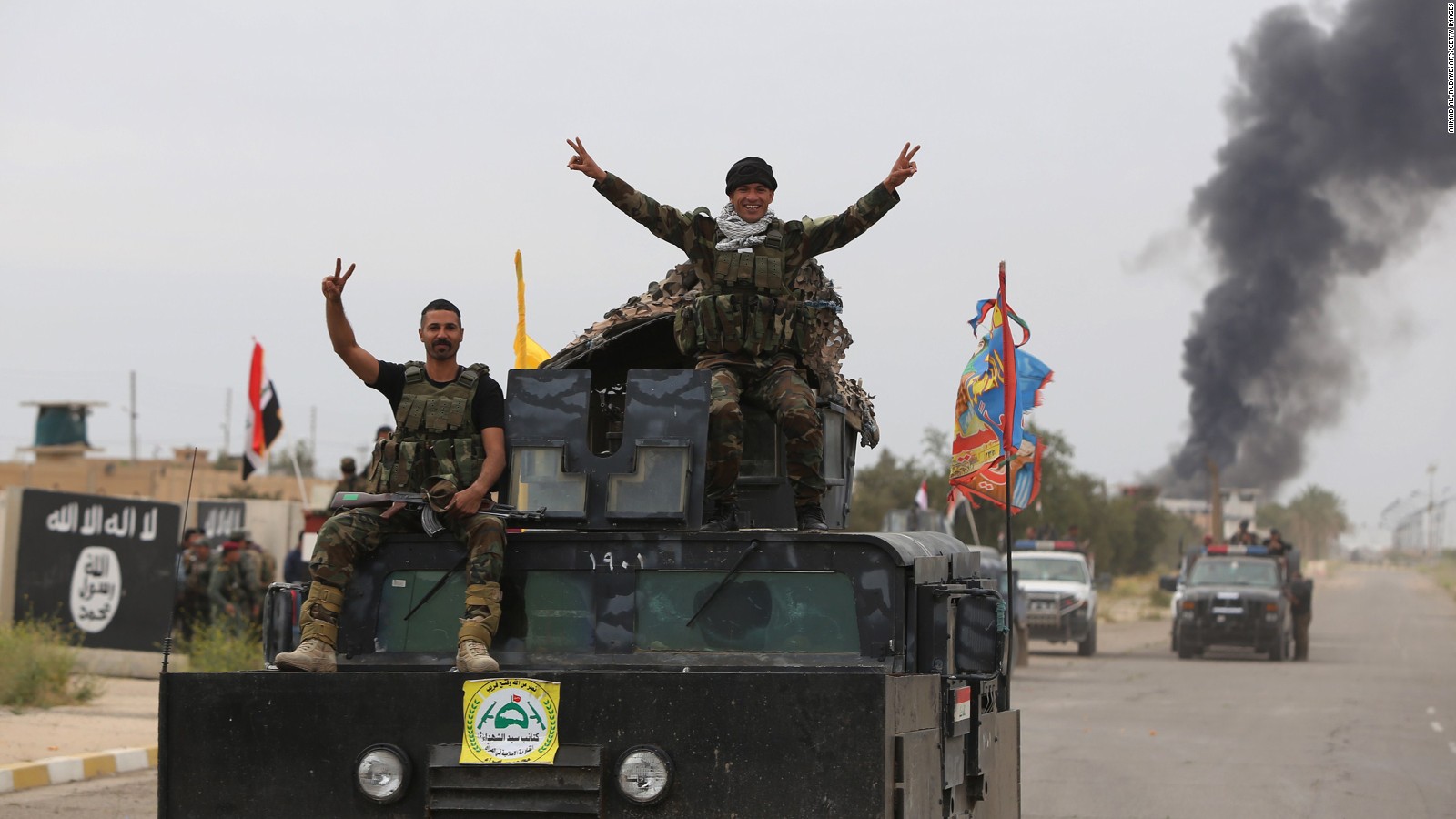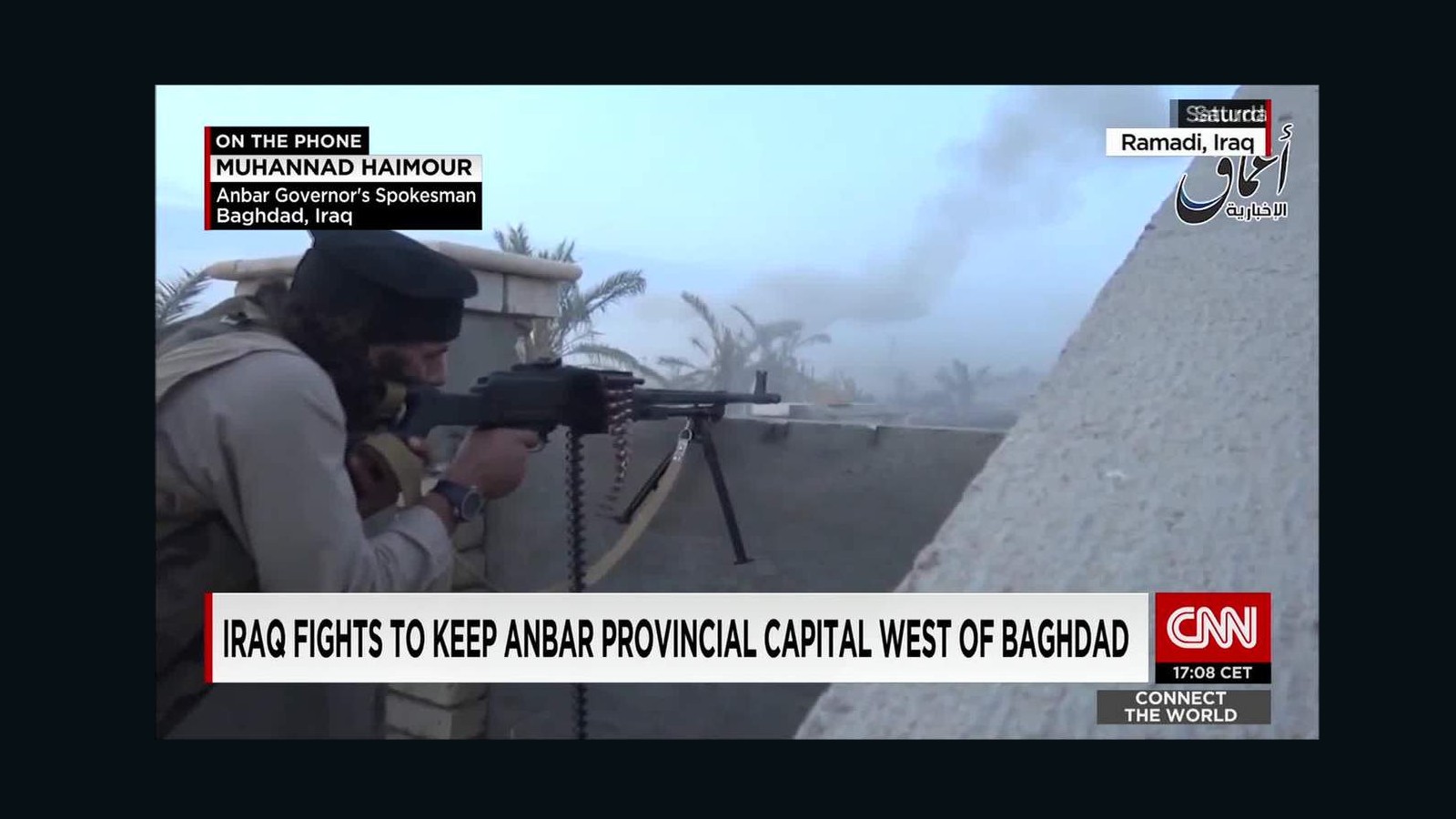Commandos took out a top ISIS moneyman, captured his wife and freed one of his slaves in a dramatic nighttime raid in Syria, officials said Saturday.
Abu Sayyaf — who ran ISIS’s lucrative black-market oil and gas sales operation and had a hand in the terror group’s military operations — died in the daring commando attack in al Omar, Syria’s largest oil field.
No US personnel were injured in the paratrooper raid, which killed 19 ISIS militants, according to the Syrian Observatory for Human Rights.
The elite Army commandos set out early Saturday to al Omar, located 80 highway miles from the Iraqi border, aboard V-22 Osprey aircraft and Black Hawk helicopters. They intended to capture Sayyaf but encountered stiff resistance at a heavily guarded multi-story building, where fighting took place “at very close quarters, and there was hand-to-hand combat,” a US official told AFP.
Abu Sayyaf was killed “when he engaged US forces,” Defense Secretary Ash Carter said in a statement.
Besides taking down Abu Sayyaf and capturing his wife, the commandos also grabbed documents, computers and other materials.
The raid departed from the usual US strategy of fighting ISIS with air raids and drone strikes. US ground forces are known to have deployed against ISIS in Syria just once before, in an unsuccessful hostage-rescue effort last summer.
Abu Sayyaf, a Tunisian citizen, was ISIS’s “emir of oil and gas,” a US official said. Iraqi officials believe he was also in charge of ISIS finances.
He had associations with top ISIS leader Abu Bakr al-Baghdadi, who claims the grandiose title of “caliph” and purports to be the world leader of all Muslims.
Earlier in his terror career, Abu Sayyaf was a follower of Osama bin Laden. He was among a number of bin Laden and al Qaeda followers who have switched allegiance to ISIS.
Abu Sayyaf’s wife, Umm Sayyaf, was flown to a location in Iraq. A US official said she was being debriefed in hope of learning more about ISIS’s operations.
Umm Sayyaf also “may have been complicit” in the enslavement of a Yazidi woman rescued in the raid, Carter said. ISIS captured members of the Yazidi religious minority last summer as they rampaged across Iraq.
Elsewhere in Syria, ISIS pushed Saturday toward the historic city of Palmyra, raising fears it would destroy its elegant columns and other architecturally significant ruins. Last week, UNESCO chief Irina Bokova pleaded with fighters to spare the city, saying “it represents an irreplaceable treasure for the Syrian people and the world.”
RAMADI taken by ISIS
(CNN)Now that the key Iraqi city of Ramadi has fallen into the hands of ISIS militants, what happens next?
It depends who you ask.
Iraqi and U.S. officials are maintaining that the tide will soon turn back against ISIS, whose fighters seized control of Ramadi on Sunday after a prolonged offensive using explosive-laden bulldozers and other vehicles driven by suicide bombers.
But
many observers say that recovering from the loss of the strategic city
-- the capital of Anbar province, Iraq's Sunni heartland -- will take a
long time.
"This is a huge setback to
Iraqi forces and to the U.S. strategy to degrade and ultimately defeat
ISIS," said Peter Mansoor, a CNN military analyst who was a colonel in
the U.S. Army.
The ISIS victory in
Ramadi, after more than a year of fighting, shows the Sunni militant
group's broader resilience in the face of sustained airstrikes from the
U.S.-led coalition and pressure from Kurdish forces in the north.
Backup forces bring their own challenges
The
Iraqi government says reinforcements for the security forces that
pulled out of Anbar on Sunday are already on their way. Ramadi is just
110 kilometers (70 miles) west of Baghdad, the heavily fortified
capital.

The ISIS terror threat
But the nature of the forces believed to be heading to Anbar to take on ISIS there could present challenges.
Iraqi
Prime Minister Haider al-Abadi has ordered the Hashd Al-Shaabi
paramilitary force -- also known as the Popular Mobilization Units -- to
prepare for deployment. It will be joined by Iraqi security forces and
Sunni tribal volunteers.
The decision
to mobilize the paramilitary force, which is Iranian-backed and
predominantly Shiite, follows a request for help from Anbar provincial
officials, tribal leaders and religious clerics.
Concerns about role of Shiite forces
The Shiite forces that are part of the Popular Mobilization Units helped the Iraqi army retake the city of Tikrit
from ISIS in March. But their involvement prompted fears that it could
inflame sectarian tensions, and their ties to Iran complicated the use
of airstrikes by the U.S. coalition.

Analyst: Iraq is a lost cause
Sending Shiite forces to fight ISIS in the heart of Sunni Iraq raised concerns among some observers.
"That
would be a different bloodbath on its own. It would be Sunni against
Shia. Who knows what that would provoke?" said Robert Baer, a CNN
intelligence and security analyst.
Muhannad
Haimour, a spokesman for the governor of Anbar, said the Popular
Mobilization Units were no longer Shiite militias but an official body
governed by law.
"The governor made the position very clear that any Iraqi who wishes to defend Iraq
is welcome to do so, provided that they are fighting under the Iraqi
banner and under the command and control of the Iraqi official security
forces," he told CNN.
'Hugely symbolic' city
But
the arrival of predominantly Shiite forces is likely to do little to
soothe the grievances of the beleaguered Sunni tribes that have been
fighting ISIS for control of Ramadi since the first half of last year.
Officials in the city have repeatedly called for more support and weapons from the Shiite-dominated government in Baghdad and for more airstrikes by the U.S.-led coalition.
But despite their warnings, one of the cities for which U.S. forces fought bitterly in 2005 and 2006 eventually fell to ISIS.
"Ramadi
is hugely symbolic," said Mansoor, a former aide to Gen. David
Petraeus, who led U.S. forces in Iraq. "It's the birthplace of the
Awakening, the tribal rebellion against al Qaeda in Iraq, the forerunner
to ISIS -- a tribal rebellion that did so much to defeat that group
back during the surge of 2007 and 2008."
On Friday, the United States announced that it was "expediting" weapon shipments to Iraq because of the fighting in Ramadi.
Speaking from Seoul, South Korea, on Monday, U.S. Secretary of State John Kerry
said that "large numbers" of ISIS fighters had been killed in the past
few days, and that more would be killed in the coming days "because that
seems to be the only thing they understand."
"It
is possible to see the kind of attack we have in Ramadi, but I am
absolutely confident in the days ahead that will be reversed," he said.
Fears of 'bloodbath' under ISIS
Now
that the city is back in the hands of terrorists, officials are
"extremely concerned about massacres that we think will be committed by
ISIS," said Haimour, the Anbar governor's spokesman.
"On
the first day that ISIS took over the city, they executed a 3-year-old
girl whose father was fighting against ISIS. And he later died in
battle," he told CNN.
ISIS has a grim track record of ruthlessly slaughtering opponents it captures.
"Anybody
who supported the government will probably be executed within the next
24 hours," said Baer. "Their families will be driven out. It will be a
bloodbath over the next couple of days. All the soldiers who were
captured will be executed."
A flood of residents has been pouring out of Ramadi toward safer parts of Anbar and Baghdad in recent days.
"We are witnessing a humanitarian crisis," said Haimour, estimating that as many as 8,000 people had left the city Sunday.
As civilians fled, the heavy fighting continued.
Officials
estimate that more than 500 people have been killed in the most recent
clashes in Ramadi, he said, noting that some pockets of resistance
against ISIS remained inside the city.
ISIS resilience, Iraqi difficulties
Some analysts said ISIS' advances in Ramadi showed the extremist group's tenacity.
"What's clear to me is ISIS is enduring and will continue to endure," said Baer.
Others said the situation reflected long-standing issues with Iraqi security forces and Western efforts to strengthen them.
"This
is not about ISIS. This is about whether the Iraqi military has the
capability and, more importantly, the will to face up with ISIS," he
said. "They've had some successes, the military has. This is a setback.
It's going to take years to figure out who will prevail."
Baer
said he thinks the fall of Ramadi rules out the likelihood of an Iraqi
offensive this summer to kick ISIS out of Mosul, the northern city where
government security forces fled from the militants last year.
"I think Ramadi's probably lost for a long time, and other parts of Al-Anbar province, as well," he said.
Haimour
said it's unfair to portray Iraqi forces as unwilling to battle ISIS.
Iraqi forces fought hard in Ramadi, he said, but faced well-trained ISIS
fighters with heavy weaponry who were on a suicide mission.
"They
come to Anbar and Iraq to die. It's very difficult to stop a bulldozer
that's been armored, driven by a suicide bomber, with tons of
explosives," he said. "And dealing with these fighters has been
extremely difficult. It's not a conventional war by any stretch of the
imagination."




No comments:
Post a Comment